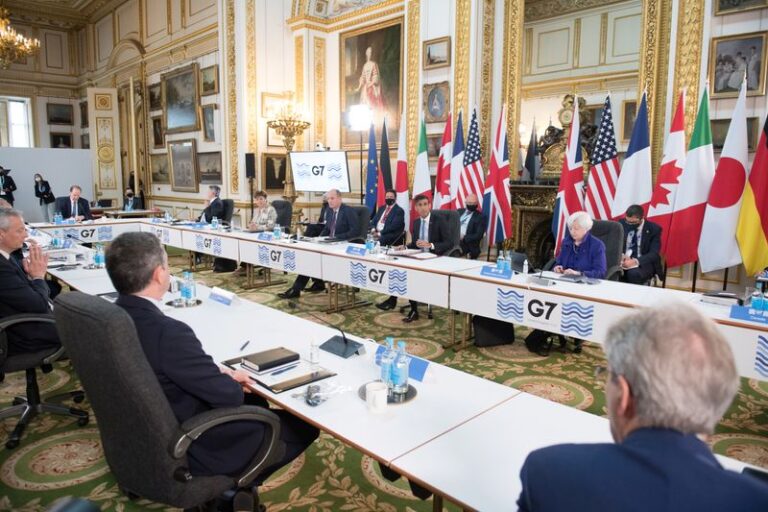Written by Gavin Jones and Giuseppe Fonte
ROME (Reuters) – A meeting of G7 finance ministers in Italy this week will bring forward the proceeds of frozen Russian assets to boost Ukraine’s war chest and push back on China’s growing export power in key sectors. The aim is to find common ground on the issue, officials said.
Finance ministers and central bankers from the Group of Seven wealthy democracies – the United States, Japan, Germany, France, Britain, Italy and Canada – will gather in the northern Italian lakeside town of Stresa on Friday and Saturday.
G7 negotiators have weighed in on how to best utilize around $300 billion worth of Russian financial assets, including major currencies and government bonds, which were frozen shortly after Moscow invaded Ukraine in February 2022. We’ve been discussing it for weeks.
The United States is seeking to find a way to front-load future revenues from these assets to back up loans of up to $50 billion in the near future.
But several officials from G7 countries, including the United States, said many legal and technical aspects needed to be worked out and they did not expect to reach a detailed agreement in Stresa.
“We’re not going to look for a term sheet over the weekend,” a senior Treasury official said, referring to the legal document that spells out the basic terms of the investment.
Instead, the official, who spoke on condition of anonymity, said G7 ministers were trying to forge an agreement around a plan to provide Ukraine with enough money up front to cover its war and civilian needs in the medium term and signal to Russia that it “cannot outlast” the West, which is economically powerful. The meeting is aimed at presenting the proposal to G7 leaders who meet in the southern Italian region of Puglia from June 13-15.
All aspects have yet to be worked out, such as who would administer the loan – the World Bank or some other institution – how it would be guaranteed, how future benefits would be estimated, and what would happen if a peace agreement were signed with Russia.
European officials were particularly cautious, with one EU diplomat saying it would take “weeks, if not months” before a final decision was made.
“Legal Implications”
Italy holds the G7 presidency this year, and its Economy Minister Giancarlo Giorgetti said last week that the U.S. proposal to use Russian assets had “very serious legal implications” that still needed to be clarified.
Russia has repeatedly warned the West of the consequences if its assets are touched and has accused the United States of bullying Europe into taking more extreme measures to stop Russia in Ukraine.
The outlook for global trade will also be at the center of Stresa’s agenda after the United States last week announced significant tariff hikes on a range of Chinese imports, including electric car batteries, computer chips and medical products. .
Giorgetti said the U.S. move was a “trade war” reflecting geopolitical tensions and warned of the risk of “fragmenting” global commerce.
The United States has not called on its partners to take similar measures against China, but one official said it would likely ask them to express shared concerns about what it called Chinese industrial “excess capacity” in a G7 communique.
U.S. Treasury Secretary Janet Yellen said Tuesday in Frankfurt that the U.S. and Europe are working “in a strategic and cohesive manner” to engage with China in order to keep manufacturers viable on both sides of the Atlantic and foster the development of the domestic clean energy industry. He said there is a need to address the threat of imports from China. .
French Finance Minister Bruno Le Maire echoed his sentiments on Wednesday, saying Europe and the G7 need to “come together” in the face of China’s industrial overcapacity.
Tax matters
Other topics to be discussed in Stresa include the impact of artificial intelligence on the global economy and a “stocktake” on sanctions against Russia, according to the official program released by the Italian presidential palace.
Taxation will also be on the agenda, with Italy seeking to revive the global minimum tax agreement on multinational companies, which was signed by some 140 countries in 2021 but has not been fully implemented due to opposition from the United States and other countries.
A proposal for a global wealth tax on billionaires, promoted by Brazil and France in the Group of 20 (G20), will also be debated in Stresa, but has been met with resistance from the United States, one official said. people spoke.
(This article has been refiled to remove repeated words “said by multiple officials” in paragraph 5)
(Additional reporting by David Lauder in Washington and Julia Payne in Brussels; Editing by Alex Richardson)

